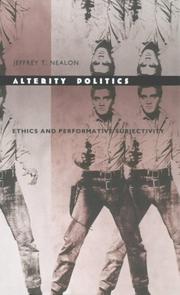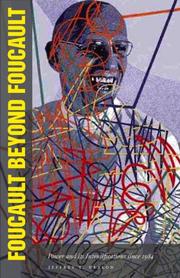| Listing 1 - 10 of 15 | << page >> |
Sort by
|
Book
ISBN: 080142853X Year: 1993 Publisher: Ithaca Cornell University Press
Abstract | Keywords | Export | Availability | Bookmark
 Loading...
Loading...Choose an application
- Reference Manager
- EndNote
- RefWorks (Direct export to RefWorks)
Deconstructie --- Deconstruction --- Déconstruction --- 82.015.9 --- American literature --- -Postmodernism (Literature) --- -Deconstruction --- Criticism --- Semiotics and literature --- English literature --- Agrarians (Group of writers) --- Literaire stromingen: postmodernisme --- History and criticism --- -Addresses, essays, lectures --- Deconstruction. --- Postmodernism (Literature) --- Theory, etc. --- 82.015.9 Literaire stromingen: postmodernisme --- History and criticism&delete& --- Theory, etc --- 20th century --- United States

ISBN: 0822321459 0822321254 9780822321255 9780822321453 0822379066 1322112576 Year: 1998 Publisher: Durham (N.C.) Duke University Press
Abstract | Keywords | Export | Availability | Bookmark
 Loading...
Loading...Choose an application
- Reference Manager
- EndNote
- RefWorks (Direct export to RefWorks)
In conventional identity politics subjective differences are understood negativively, as gaps to be overcome, as lacks of sameness, as evidence of failed or incomplete unity. In Alterity Politics, Jeffrey T. Nealon argues instead for a concrete and ethical understanding of community, one that requires response, action, and performance instead of passive resentment and unproductive mourning for a whole that cannot be attained.
Group identity --- Identity politics. --- Political psychology. --- Political sociology. --- Social ethics. --- Identité collective --- Identité (Psychologie) --- Psychologie politique. --- Sociologie politique. --- Morale sociale. --- Identité (psychologie) --- Politische Psychologie. --- Political aspects. --- Aspect politique. --- Identity politics --- Political psychology --- Political sociology --- Social ethics --- Ethics --- Social problems --- Sociology --- Mass political behavior --- Political behavior --- Political science --- Politics, Practical --- Psychology, Political --- Psychology --- Social psychology --- Identity (Psychology) --- Politics of identity --- Political participation --- Collective identity --- Community identity --- Cultural identity --- Social identity --- Collective memory --- Political aspects --- Sociological aspects --- Psychological aspects
Book
ISBN: 0804783217 9780804783217 9780804781442 9780804781459 0804781443 Year: 2012 Publisher: Stanford, Calif. Stanford University Press
Abstract | Keywords | Export | Availability | Bookmark
 Loading...
Loading...Choose an application
- Reference Manager
- EndNote
- RefWorks (Direct export to RefWorks)
Post-Postmodernism begins with a simple premise: we no longer live in the world of ""postmodernism,"" famously dubbed ""the cultural logic of late capitalism"" by Fredric Jameson in 1984. Far from charting any simple move ""beyond"" postmodernism since the 1980's, though, this book argues that we've experienced an intensification of postmodern capitalism over the past decades, an increasing saturation of the economic sphere into formerly independent segments of everyday cultural life.
Culture - Economic aspects - United States. --- Culture -- Economic aspects -- United States. --- Culture -- Economic aspects. --- Literature - History and criticism - Theory, etc. --- Literature -- History and criticism -- Theory, etc. --- Literature -- History and criticism. --- Post-postmodernism - United States. --- Post-postmodernism -- United States. --- Post-postmodernism. --- Culture --- Literature --- Post-postmodernism --- Sociology & Social History --- Social Sciences --- Social Change --- Post-post-modernism --- Arts, Modern --- Philosophy, Modern --- Postmodernism --- Belles-lettres --- Western literature (Western countries) --- World literature --- Philology --- Authors --- Authorship --- Cultural sociology --- Sociology of culture --- Civilization --- Popular culture --- Economic aspects --- History and criticism --- Theory, etc --- Social aspects --- Economic aspects. --- Theory, etc. --- Literature History and criticism --- History and criticism.
Book
ISBN: 0804796785 9780804796781 9780804795715 0804795711 9780804796750 0804796750 Year: 2016 Publisher: Stanford, California
Abstract | Keywords | Export | Availability | Bookmark
 Loading...
Loading...Choose an application
- Reference Manager
- EndNote
- RefWorks (Direct export to RefWorks)
In our age of ecological disaster, this book joins the growing philosophical literature on vegetable life to ask how our present debates about biopower and animal studies change if we take plants as a linchpin for thinking about biopolitics. Logically enough, the book uses animal studies as a way into the subject, but it does so in unexpected ways. Upending critical approaches of biopolitical regimes, it argues that it is plants rather than animals that are the forgotten and abjected forms of life under humanist biopower. Indeed, biopolitical theory has consistently sidestepped the issue of vegetable life, and more recently, has been outright hostile to it. Provocatively, Jeffrey T. Nealon wonders whether animal studies, which has taken the "inventor" of biopower himself to task for speciesism, has not misread Foucault, thereby managing to extend humanist biopower rather than to curb its reach. Nealon is interested in how and why this is the case. Plant Theory turns to several other thinkers of the high theory generation in an effort to imagine new futures for the ongoing biopolitical debate.
Plants (Philosophy) --- Biopolitics. --- Political behavior --- Human behavior --- Political science --- Sociobiology --- Philosophy

ISBN: 0804768447 9780804768443 9780804757010 0804757011 9780804757027 080475702X Year: 2008 Publisher: Stanford, Calif. Stanford University Press
Abstract | Keywords | Export | Availability | Bookmark
 Loading...
Loading...Choose an application
- Reference Manager
- EndNote
- RefWorks (Direct export to RefWorks)
In Foucault Beyond Foucault Jeffrey Nealon argues that critics have too hastily abandoned Foucault's mid-career reflections on power, and offers a revisionist reading of the philosopher's middle and later works. Retracing power's "intensification" in Foucault, Nealon argues that forms of political power remain central to Foucault's concerns. He allows us to reread Foucault's own conceptual itinerary and, more importantly, to think about how we might respond to the mutations of power that have taken place since the philosopher's death in 1984. In this, the book stages an overdue encounter between Foucault and post-Marxist economic history.
PHILOSOPHY / Criticism. --- Foucault, Michel, --- Fūkūh, Mīshīl, --- Foucault, Michael, --- Fuko, Mišel, --- Pʻukʻo, --- Pʻukʻo, Misyel, --- Phoukō, Misel, --- Fuke --- 福柯 --- Fuḳo, Mishel, --- Foucault, Michel
Book
ISBN: 1496210972 1496210956 9781496210951 9781496210975 9781496208651 149620865X 9781496210968 Year: 2018 Publisher: Lincoln
Abstract | Keywords | Export | Availability | Bookmark
 Loading...
Loading...Choose an application
- Reference Manager
- EndNote
- RefWorks (Direct export to RefWorks)
Biopolitics --- Neoliberalism --- Popular music --- Music, Popular --- Music, Popular (Songs, etc.) --- Pop music --- Popular songs --- Popular vocal music --- Songs, Popular --- Vocal music, Popular --- Music --- Cover versions --- Neo-liberalism --- Liberalism --- Political behavior --- Human behavior --- Political science --- Sociobiology --- Political aspects
Book
ISBN: 9781517910853 9781517910860 Year: 2021 Publisher: Minneapolis, Minn. University of Minnesota Press
Abstract | Keywords | Export | Availability | Bookmark
 Loading...
Loading...Choose an application
- Reference Manager
- EndNote
- RefWorks (Direct export to RefWorks)
Book
ISBN: 9781501744716 Year: 2019 Publisher: Ithaca, NY
Abstract | Keywords | Export | Availability | Bookmark
 Loading...
Loading...Choose an application
- Reference Manager
- EndNote
- RefWorks (Direct export to RefWorks)
Book
ISBN: 1839983965 1839983973 1839983957 9781839983962 9781839983979 Year: 2022 Publisher: La Vergne [Tennessee] : Anthem Press,
Abstract | Keywords | Export | Availability | Bookmark
 Loading...
Loading...Choose an application
- Reference Manager
- EndNote
- RefWorks (Direct export to RefWorks)
Elegy for Literature is an overview of the current crisis within the academic study of literature. It suggests a way forward for rethinking the work that literary studies can do - less as a set of literary objects, and more as a way of life.
Criticism --- Literature --- Study and teaching (Higher) --- History and criticism
Digital
ISBN: 9781501744716 Year: 2019 Publisher: Ithaca, N.Y. Cornell University Press
Abstract | Keywords | Export | Availability | Bookmark
 Loading...
Loading...Choose an application
- Reference Manager
- EndNote
- RefWorks (Direct export to RefWorks)
| Listing 1 - 10 of 15 | << page >> |
Sort by
|

 Search
Search Feedback
Feedback About UniCat
About UniCat  Help
Help News
News